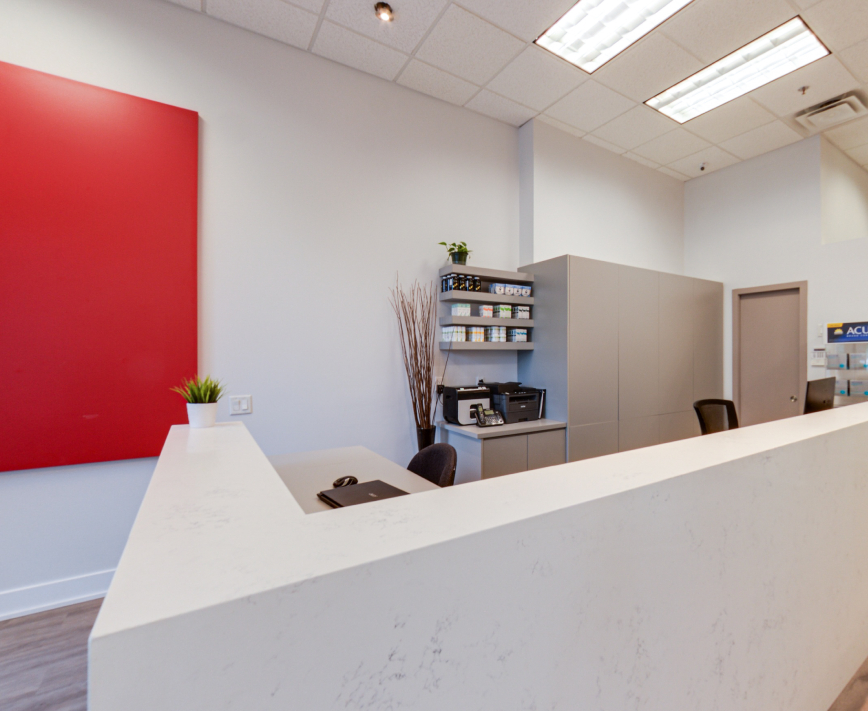

Here For All Your Specific Eye Care Needs
What is preventing you from having the vision you need? Your eyes can be impacted in a variety of ways, but with the help of our team, you can find the solutions you need to enjoy your eyesight with ease and comfort.
We offer a range of incredible specialty services to help ensure you’re getting the care your eyes need. Please, book an appointment today and unlock the potential of your vision.
Laser Eye Surgery Consultations
Laser eye surgery is an efficient, minimally invasive procedure that can improve your vision to a point where you may no longer need corrective eyewear.
At Humber Bay Eye Care, we offer in-office consultations and post-laser surgery recovery care. You’ll have our dedicated team looking after you to ensure the continuity of care that you deserve.
What We Can Do to Help
A consultation includes a complete review of your patient history and a full assessment of your eye health and vision. Before we refer you for surgery, we need to make sure you’re a good candidate, and consider any factors that may affect your results. We’ll also discuss your surgery options and what type of procedure is best for you.
Once you have scheduled your surgery, we’ll contact you for follow-up appointments at our office. Typically, your first follow-up appointment is the day after surgery. You’ll then have periodic follow-up visits in our office over the next 6 months. After 1 year, we recommend have a full eye exam to determine the long-term results of your procedure.
Types of Laser Eye Surgery
Laser eye surgery uses surgical lasers to correct vision by reshaping the corneal surface. Two of the most common types of laser eye surgery are PRK and LASIK.
LASIK, or laser-assisted in situ keratomileusis, is one of the most popular surgical options. It was specifically developed to reduce healing time and the risk of infection.
The surgery begins with creating a flap in the cornea’s outer layer to expose the tissue below. The surgeon will then reshape the middle layers of the cornea with a laser to correct the refractive error and your vision.
Once this is complete, the corneal flap is carefully folded back over the newly-shaped cornea to act as a natural bandage.
With this procedure, you can expect clear vision within 24 to 48 hours. Your post-operative care will likely consist of periodic follow-up appointments and eye drops.
PRK, or photorefractive keratectomy, is often the chosen procedure for thin corneas, dry eyes, or people who play contact sports because it doesn’t require the creation of a corneal flap.
During the procedure, the outer layer of the cornea is gently removed. A laser is then used to reshape the underlying corneal tissues to correct vision.
Your post-operative care will likely consist of bandage contact lenses for the first 2-3 days to help your corneas heal, and eye drops for 4 to 6 weeks.
Digital Eye Strain
If you spend a lot of time on your computer or smartphone and you’ve noticed that your eyes are sore towards the end of the day, you’re likely experiencing digital eye strain. The visual demands of computer work are unlike those associated with most other activities.
Eye strain or blurred vision during computer work may be due to an inability of your eyes to remain accurately focused on your screen or because your eyes have trouble changing focus from your keyboard to your screen, to distance, and back again for prolonged periods.
- Dry eyes
- Tearing
- Burning or itching eyes
- Double vision or blurred vision
- Difficulty concentrating
- Fatigue
- Light sensitivity
- Headache
- Neck or back pain
- Difficulty focusing
- Poor lighting
- Glare on digital screens
- Improper viewing distances
- Poor sitting posture
- Uncorrected vision and focusing problems
What Can You Do to Reduce the Strain?
A comprehensive eye exam helps rule out vision or eye health problems and determines if you require an updated eyeglass prescription. Even small inaccuracies in your prescription lenses can contribute to computer vision problems.
Computer glasses reduce the need for excessive focusing effort. Special lens designs, powers, and coatings help to maximize visual comfort. They boost contrast as well as filter out glare and harmful blue light.
This is a lens treatment that filters natural and artificial blue light emitted from the sun, TV, and digital devices.
Extensive exposure to blue light leads to eye strain, insufficient visual contrast, and headaches. Further, it may increase the risk of retinal disease.
Our brains use blue light to regulate our sleeping patterns and circadian rhythm. It also alters our sleep cycle by suppressing our melatonin secretion. As such, exposure at night often leads to sleep disruption resulting in fatigue throughout the day.
- Position your screen about 15 to 20 degrees below eye level (about 4 or 5 inches) as measured from the center of the screen and 20 to 28 inches from the eyes.
- Minimize reflected glare on your screen by using dimmer switches on lights and a protective anti-glare screen cover. Also consider positioning your screen so that it sits perpendicular to windows and other bright light sources. Use blinds or drapes on windows and replace the light bulbs in desk lamps with bulbs of lower wattage.
- Give your eyes a break by following the 20-20-20 rule. Look away from the screen every 20 minutes or so and look at something around 20 feet away for about 20 seconds
- Tweak your settings and adjust the brightness, contrast, and font size until you determine what’s best for you.
Emergency Eye Care
Eye emergencies can happen to anyone, even the most cautious. It’s important to recognize and understand the risks of activities that may cause harm.
If you are experiencing an eye emergency, please call our office at (416) 259-3553, and we will do our best to schedule a same day appointment. If our office is closed, please proceed to the nearest emergency room.
Eye emergencies that require immediate attention include:
- Eye pain
- Sudden loss of vision
- Foreign object in your eye
- Sudden onset of flashes of light or floaters
- Swelling around the eye
- Corneal abrasion (a scratch on the surface of the eye)
- Significant discharge
- Persistent burning or itching
- Severe light sensitivity
- Significant contact lens discomfort
If you are experiencing symptoms that aren’t listed above, but you’re concerned, please give us a call. Even a seemingly minor problem could compromise your vision.
Our Location

Our Address
2129 Lakeshore Boulevard WestEtobicoke, ON M8V 0B3
Clinic Hours

Our Services
Our Brands
















